
So I saw that, quickly after they were got out of the fair, they overtook one that was going before them, whose name was BY-ENDS; So they said to him, "What countryman, sir? and how far go you this way?" He told them that he came from the town of Fairspeech; and he was going to the Celestial City (but told them not his name).
Chr. "From Fairspeech!" said CHRISTIAN; "is there any that be good live there?"
(Proverbs 26:25)
By-ends. "Yes," said BY-ENDS, "I hope."
Chr. "Pray, sir, what may I call you?" said CHRISTIAN.
By-ends. I am a stranger to you, and you to me: if you be going this way, I shall be glad of your company: if not, I must be content.
Chr. "This town of Fairspeech," said CHRISTIAN, "I have heard of; and, as I remember, they say it is a wealthy place."
By-ends. Yes, I will assure you that it is; and I have very many rich kindred there.
Chr. Pray who are your kindred there, if a man may be so bold?
By-ends. Almost the whole town: and in particular, my Lord TURN-ABOUT; my Lord TIME-SERVER; my Lord FAIRSPEECH (from whose ancestors that town first took its name); also Mr. SMOOTH-MAN; Mr. FACING-BOTH-WAYS; Mr. ANY-THING; and the parson of our parish, Mr. TWO-TONGUES, was my mother's own brother by father's side. And to tell you the truth, I am become a gentleman of good quality; yet my great-grandfather was but a waterman, looking one way and rowing another-- and I got most of my estate by the same occupation.
Chr. Are you a married man?
By-ends. Yes; and my wife is a very virtuous woman--the daughter of a virtuous woman. She is my Lady FEIGNING'S daughter; therefore she came of a very honourable family, and is arrived to such a pitch of breeding, that she knows how to carry it to all, even to prince and peasant. 'Tis true, we somewhat differ in religion from those of the stricter sort; yet but in two small points: First, we never strive against wind and tide; secondly, we are always most zealous when religion goes in his silver slippers--we love much to walk with him in the street if the sun shines, and the people applaud it.
Then CHRISTIAN stepped a little aside to his fellow HOPEFUL, saying, "It runs in my mind that this is one BY-ENDS, of Fairspeech and if it be he, we have as very a knave in our company as dwells in all these parts." Then said HOPEFUL, "Ask him; methinks he should not be ashamed of his name." So CHRISTIAN came up with him again, and said, "Sir, you talk as if you knew something more than all the world doth; and if I take not my mark amiss, I deem I have half a guess of you: Is not your name Mr. BY-ENDS, of Fairspeech?"
By-ends. That is not my name: but indeed it is a nickname that is given me by some that cannot abide me: and I must be content to bear it as a reproach, as other good men have borne theirs before me.
Chr. But did you never give an occasion to men to call you by this name?
By-ends. Never, never! the worst that ever I did to give them an occasion to give me this name was, that I had always the luck to jump in my judgment with the present way of the times, whatever it was, and my chance was to gain thereby; but if things are thus cast upon me, let me count them a blessing, but let not the malicious load me therefore with reproach.
Chr. I thought indeed that you were the man that I had heard of; and to tell you what I think, I fear this name belongs to you more properly than you are willing we should think it doth.
By-ends. Well, if you will thus imagine, I cannot help it. You shall find me a fair company-keeper, if you will still admit me your associate.
Chr. If you will go with us, you must go against wind and tide, the which, I perceive, is against your opinion; you must also own religion in his rags as well as when in his silver slippers; and stand by him too when bound in irons, as well as when he walks the streets with applause.
By-ends. You must not impose nor lord it over my faith; leave me to my liberty, and let me go with you.
Chr. Not a step farther, unless you will do, in what I propound, as we.
By-ends. Then said BY-ENDS, "I shall never desert my old principles, since they are harmless and profitable. If I may not go with you, I must do as I did before you overtook me: even go by myself, until some overtake me that will be glad of my company."
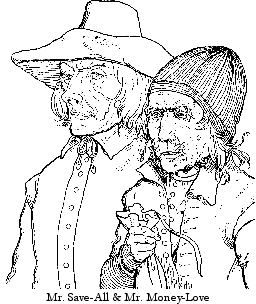
Now I saw in my dream that CHRISTIAN and HOPEFUL forsook him, and kept their distance before him; but one of them looking back, saw three men following Mr. BY-ENDS; and behold, as they came up with him, he made them a very low bow, and they also gave him a compliment. The men's names were, Mr. HOLD-THE-WORLD, Mr. MONEY-LOVE, and Mr. SAVE-ALL --men that Mr. BY-ENDS had formerly been acquainted with; for in their minority they were schoolfellows, and were taught by one Mr. GRIPEMAN, a schoolmaster in Love-gain, which is a market town in the county of Coveting, in the north. This schoolmaster taught them the art of getting, either by violence, fraud, flattery, lying, or by putting on a guise of religion; and these four gentlemen had attained much of the art of their master, so that they could each of them have kept such a school themselves.
Well, when they had, as I said, thus saluted each other, Mr. MONEY-LOVE said to Mr. BY-ENDS, "Who are they upon the road before us?" For CHRISTIAN and HOPEFUL were yet within view.
By-ends. They are a couple of far countrymen, that, their mode, are going on pilgrimage.
Money-love. Alas! why did they not stay, that we might have had their good company; for they, and we, and you, sir, I hope, are all going on a pilgrimage?
By-ends. We are so, indeed; but the men before us are so rigid, and love so much their own notions, and do also so lightly esteem the opinions of others, that even if a man be never so godly, yet, if he jumps not with them in all things, they thrust him quite out of their company.
Mr. Save-all. That's bad; but we read of some that are righteous overmuch, and such men's rigidness prevails with them to judge and condemn all but themselves. But, I pray, what and how many were the things wherein you differed?
By-ends. Why, they, after their headstrong manner, conclude that it is their duty to rush on their journey all weathers; and I am for waiting for wind and tide. They are for hazarding all for God at a clap; and I am for taking all advantages to secure my life and estate. They are for holding their notions, though all other men be against them; but I am for religion in and so far as the times and my safety will bear it. They are for religion when in rags and contempt; but I am for him when he walks in his golden slippers in the sunshine, and with applause.
Mr. Hold-the-World. Aye, and hold you there still, good Mr. BY-ENDS; for, for my part, I can count him but a fool, that, having the liberty to keep what he has, shall be so unwise as to lose it. Let us be wise as serpents; 'tis best to make hay when the sun shines: you see how the bee lies still all winter, and bestirs her only when she can have profit with pleasure. God sends sometimes rain, and sometimes sunshine; if they be such fools to go through the first, yet let us be content to take fair weather along with us. For my part, I like that religion best that will stand with the security of God's good blessings unto us; for who can imagine, that is ruled by his reason, since God has bestowed upon us the good things of this life, but that he would have us keep them for his sake? Abraham and Solomon grew rich in religion. And Job says, "That a good man shall lay up gold as dust." But he must not be such as the men before us, if they be as you have described them.
Mr. Save-all. I think that we are all agreed in this matter; and therefore there need be no more words about it.
Mr. Money-love. No, there need be no more words about this matter indeed; for he that believes neither Scripture nor reason (and you see we have both on our side), neither knows his own liberty nor seeks his own safety.
Mr. By-ends. My brethren, we are, as you see, going all on pilgrimage; and for our better diversion from things that are bad, give me leave to propound unto you this question: Suppose a man--a minister, or a tradesman,--should have an advantage lie before him to get the good blessings of this life; yet so as that he can by no means come by them except-- in appearance at least--he becomes extraordinarily zealous in some points of religion that he meddled not with before: may he not use this means to attain his end, and yet be a right honest man?
Mr. Money-love. I see the bottom of your question; and, with these gentlemen's good leave, I will endeavour to shape you an answer. And first, to speak to your question as it concerns a minister himself: Suppose a minister, a worthy man, possessed but of a very small benefice, and has in his eye a greater, more fat and plump by far; he has also, now an opportunity of getting of it; yet so as by being more studious, by preaching more frequently and zealously, and because the temper of the people requires it, by altering of some of his principles; for my part, I see no reason but a man may do this--provided he has a call. Aye, and more a great deal besides, and yet be an honest man. For why?
1. His desire of a greater benefice is lawful (this cannot be contradicted), since 'tis set before him by Providence; so, then, he may get it if he can, making no question, for conscience' sake.
2. Besides, his desire after that benefice makes him more studious, a more zealous preacher, and so on; and so makes him a better man. Yea, makes him better improve his parts, which is according to the mind of God.
3. Now, as for his complying with the temper of his people by dissenting--to serve them--some of his principles, this argues, 1st, that he is of a self-denying temper; 2nd, of a sweet and willing deportment; 3rd, and so more fit for the ministerial function.
4. I conclude then, that a minister that changes a small for a great, should not for so doing be judged as covetous; but rather, since he is improved in his parts and industry thereby, be counted as one that pursues his call, and the opportunity put into his hand to do good.
And now to the second part of the question, which concerns the tradesman you mentioned: Suppose such one to have but a poor employ in the world, but by becoming religious he may mend his market, perhaps get a rich wife, or more and far better customers to his shop--for my part, I see no reason but that this may be lawfully done. For why?
1. To become religious is a virtue, by what means soever a man becomes so.
2. Nor is it unlawful to get a rich wife, or more custom to my shop.
3. Besides, the man that gets these by becoming religious, gets that which is good of them that are good, by becoming good himself; so, then, here is a good wife, and good customers, and good gain, and all these by becoming religious, which is good. Therefore, to become religious, to get all these, is a good and profitable design.
This answer, thus made by this Mr. MONEY-LOVE to Mr. BY-ENDS' question, was highly applauded by them all; therefore they concluded upon the whole, that it was most wholesome and advantageous. And because, as they thought, no man was able to contradict it; and because CHRISTIAN and HOPEFUL were yet within call, they joyfully agreed to assault them with the question as soon as they overtook them, and the rather because they had opposed Mr. BY-ENDS before. So they called after them; and they stopped, and stood still till they came up to them. But they concluded as they went, that not Mr. BY-ENDS, but old Mr. HOLD-THE-WORLD, should propound the question to them; because, as they supposed, their answer to him would be without the remainder of that heat that was kindled betwixt Mr. BY-ENDS and them at their parting a little before.
So they came up to each other; and after a short salutation, Mr. HOLD-THE-WORLD propounded the question to CHRISTIAN and his fellow, and bid them to answer if they could.
Chr. Then said CHRISTIAN, "Even a babe in religion may answer ten thousand such questions. For if it be unlawful to follow Christ for loaves, as it is:
~ John 6:1-60 ~
how much more abominable is it to make of him and religion a stalking-horse to get and enjoy the world! nor do we find any other than heathens, hypocrites, devils, and witches, that are of this opinion.
"1. Heathens, for when Hamor and Shechem had a mind to the daughter and cattle of Jacob, and saw that there were no ways for them to come at them, but by becoming circumcised, they say to their companions: 'If every male of us be circumcised, as they are circumcised, shall not their cattle, and their substance, and every beast of theirs be ours?' Their daughters and their cattle were that which they sought to obtain; and their religion the stalking-horse they made use of to come at them. Read the whole story.
~ Genesis 34:20-23 ~
"2. The hypocritical Pharisees were also of this religion; long prayers were their pretence, but to get widows' houses were their intent; and greater damnation from God was their judgment.
~ Luke 20:46, 47 ~
"3. Judas the devil was also of this religion; he was religious for the bag, that he might be possessed of what was therein; but he was lost, cast away, and the very son of perdition.
"4. Simon the witch was of this religion too; for he would have had the Holy Ghost, that he might have got money therewith and his sentence from Peter's mouth was according.
~ Acts 8:19-22 ~
"5. Neither will it out of my mind, but that the man that takes up religion for the world will throw away religion for the world; for so surely as Judas designed the world in becoming religious, so surely did he also sell religion and his Master for the same. To answer the question more affirmatively, as I perceive you have done, and to accept as authentic such answer, is both heathenish, hypocritical, and devilish; and your reward will be according to your works."
Then they stood staring one upon another, but had not wherewith to answer CHRISTIAN. HOPEFUL also approved of the soundness of CHRISTIAN'S answer; so there was a great silence among them. Mr. BY-ENDS and his company also staggered, and kept behind, that CHRISTIAN and HOPEFUL might outgo them. Then said CHRISTIAN to his fellow, "If these men cannot stand before the sentence of men, what will they do with the sentence of God? and if they are mute when dealt with by vessels of clay, what will they do when they shall be rebuked by the flames of a devouring fire?"
Demas
Then CHRISTIAN and HOPEFUL, outwent them again, and went till they came at a delicate plain, called Ease, where they went with much content; but that plain was but narrow, so they were quickly got over it. Now at the further side of that plain was a little hill called Lucre, and in that hill a silver mine, which some of them that had formerly gone that way, because of the rarity of it, had turned aside to see; but going too near the brink of the pit, the ground being deceitful under them, broke, and they were slain; some also had been maimed there, and could not to their dying day be their own men again.
Then I saw in my dream, that a little off the road, over against the silver mine, stood DEMAS (gentleman-like), to call to passengers to come and see; who said to CHRISTIAN and his fellow, "Ho, turn aside hither, and I will show you a thing."
Chr. What thing is so deserving as to turn us out of the way to see it?
Demas. Here is a silver mine, and some digging in it for treasure; if you will come, with a little pain you may richly provide for yourselves.
Hope. Then said HOPEFUL, "Let us go and see."
Chr. "Not I," said CHRISTIAN; "I have heard of this place before now and how many have there been slain; and besides, that treasure is a snare to those that seek it, for it hinders them in their pilgrimage." Then CHRISTIAN called to DEMAS, saying, "Is not the place dangerous? hath it not hindered many in their pilgrimage?"
~ Hosea 4:16-19 ~
Demas. "Not very dangerous; except to those that are careless;" but withal, he blushed as he spake.
Chr. Then said CHRISTIAN to HOPEFUL, "Let us not stir a step, but still keep on our way."
Hope. I will warrant you, when BY-ENDS comes up, if he hath the same invitation as we, he will turn in thither to see.
Chr. No doubt thereof, for his principles lead him that way; and a hundred to one but he dies there.
Demas. Then DEMAS called again, saying, "But will you not come over and see?"
Chr. Then CHRISTIAN roundly answered, saying, "DEMAS, thou art an enemy to the right ways of the Lord of this way, and hast been already condemned for thine own turning aside by one of his Majesty's judges; and why seekest thou to bring us into the like condemnation?
~ 2 Timothy 4:10 ~
Besides, if we at all turn aside, our Lord the King will certainly hear thereof, and will there put us to shame, where we would stand with boldness before him."
Demas cried again, That he also was one of their fraternity; and that if they would tarry a little, he also himself would walk with them.
Chr. Then said Christian, "What is thy name? is it not the same by the which I have called thee?"
Demas. Yes, my name is DEMAS; I am the son of Abraham.
Chr. I know you; Gehazi was your great-grandfather, and Judas your father, and you have trod their steps. It is but a devilish prank that thou usest: thy father was hanged for a traitor; and thou deservest no better reward.
~ 2 Kings 5:20 ~ Matthew 26:14, 15 ~ Matthew 27:1-5 ~
Assure thyself, that when we come to the King, we will tell him of this thy behaviour.
Thus they went their way.
By this time BY-ENDS and his companions were come again within sight; and they at the first beck went over to DEMAS. Now, whether they fell into the pit by looking over the brink thereof, or whether they went down to dig, or whether they were smothered in the bottom by the damps that commonly arise, of these things I am not certain; but this I observed, that they never were seen again in the way. Then sang CHRISTIAN:
"BY-ENDS and SILVER-DEMAS doth agree;
One calls, the other runs, that he may be
A sharer in his lucre: so these two
Take up in this world, and no farther go."






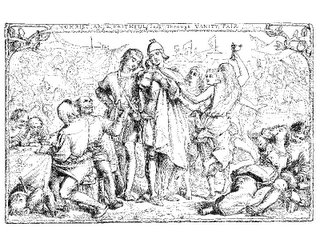
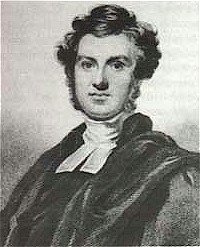
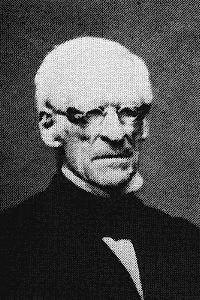
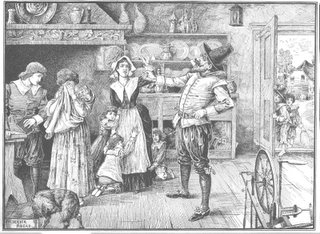






 This is suppose to be the header for recent posts, but since I moved to the "new" blogger, it no longer works.
This is suppose to be the header for recent posts, but since I moved to the "new" blogger, it no longer works.
 This header for archived posts, is also redundant, but since I have them here, they will stay, for a while.
This header for archived posts, is also redundant, but since I have them here, they will stay, for a while.

